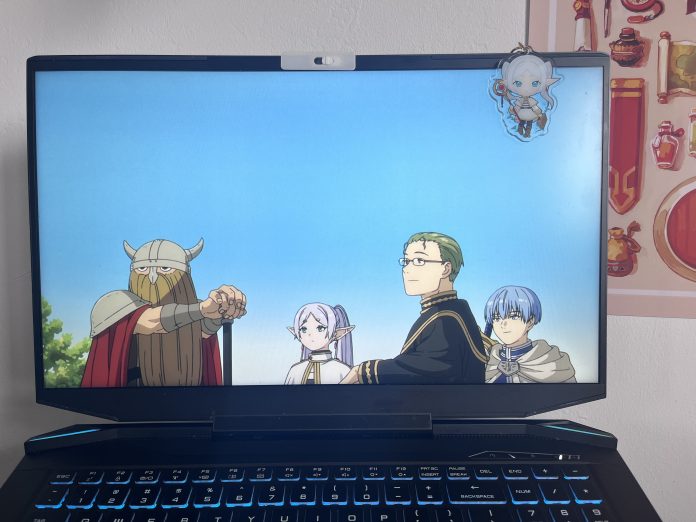Jasmine Liang
Arts & Entertainment Editor
On Sept. 9, 2023, the fantasy anime “Frieren: Beyond Journey’s End” (“Frieren”) debuted on Crunchyroll as a MadHouse studio adaptation of the titular manga series by Kanehito Yamada and Tsukasa Abe. It recently concluded its 28-episode first season on March 22, receiving 4.9 stars on Crunchyroll, 100% on Rotten Tomatoes, 8.9 on IMDB, and rank one on MyAnimeList.
The anime follows the elven mage Frieren after she successfully slays the Demon King with her party: Himmel the Hero, Eisen the dwarven warrior, and Heiter the human priest. Instead of focusing on their ten-year adventure of sharpening their skills and battling the fiercest demons, the show truly begins 50 years later, when everyone but Frieren and Eisen have aged well into elders. Frieren is confronted with human mortality; Himmel passes, and Heiter soon after — but not before leaving her in the care of the human child Fern, a magical prodigy.
Frieren reluctantly accepts guardianship over Fern and mentors her in magic. While the anime revels in an initial onslaught of grief, it centers on the relationship between Frieren and Fern as the latter grows into a young woman. Their dynamic shifts with the additional companionship of the warrior Stark, a human disciple of Eisen, as they set out on a quest to Ender — this world’s version of heaven — so that Frieren may reconcile her regret and grief toward her former companions, particularly Himmel.
Himmel’s presence punctuates Frieren’s journey long after he’s passed. As Frieren retraces the steps of her original party, accompanied by Fern and Stark, we see Himmel in flashbacks, withered statues, and townsfolk who have handed down his heroic stories like an heirloom. Frieren’s long lifespan may make human lives look small, but Himmel’s legacy — which continues to shape Frieren into a better person — proves otherwise. Although “Frieren” is told through the eyes of an elf, it accentuates human nature’s inclination to adapt, learn, and covet greatness.
Alongside raving reviews, fans of “Frieren” often claim that it has saved the fantasy anime genre. Its wide appeal and praise has revealed a hunger for novel, interpersonal stories with a focus on the human condition. Forget isekais, constant action, and fan service — audiences crave slow, wandering stories with meaningful relationships. Most episodes of “Frieren” involve little dire conflict; in episode two, Frieren and Fern spend six months looking for Himmel’s favorite flower so that it might be planted around his statue again.
However, it’s the soft fantasy backdrop of “Frieren” that enables it to tell a distinctly anti-progress and non-urgent tale. Set during the Era of Peace, a period initiated by Frieren’s party after they defeated the Demon King, the anime often points out Frieren’s identity as a mage that not only established peace, but belongs to it. Despite having trained to kill demons for most of her youth, she relishes non-violent spells and spends her energy collecting them, such as her favorite spell, which spawns a field of aromatic flowers.
Her story calls to mind Terry Pratchett’s 1992 short story “Troll Bridge,” whose hero protagonist no longer suits the world that he already saved. In the epigraph, Pratchett writes, “You fight a war to change the world, and it changes into a world with no place in it for you, the fighter. Those who fight for the bright future are not always, by nature, well fitted to live in it.” His vignette shares a short but tragic view of a hero left behind by the new world, while “Frieren” offers us an optimistic reversal. With Frieren’s success in instating an Era of Peace, she creates a world where she is no longer necessary.
Such a fate seems destined for sadness, but instead, Frieren carves out space to be free, to enjoy everyday mundanities, leisurely uncovering all of what life has to offer. When watching “Frieren,” it’s impossible not to embrace the tranquility that contrasts so starkly with reality. The world of “Frieren” draws us in with a simple reassurance: take your time.
The truth about entertainment is that it often centers violence as the instigator for conflict. Who doesn’t enjoy fantastical and epic battles that bring our heroes to their absolute limits? (There’s a reason why “Jujutsu Kaisen” and “Demon Slayer: Kimetsu no Yaiba” are so popular.) But, as “Frieren” shows us, there is room for other stories. The trope-heavy staples of fantasy anime no longer satisfy audiences who want something deeper from their narratives.
Hopefully, “Frieren” sets a precedent for future fantasy anime that pressures publishers for higher quality stories.
For now? Watch “Frieren” and savor it slowly.











